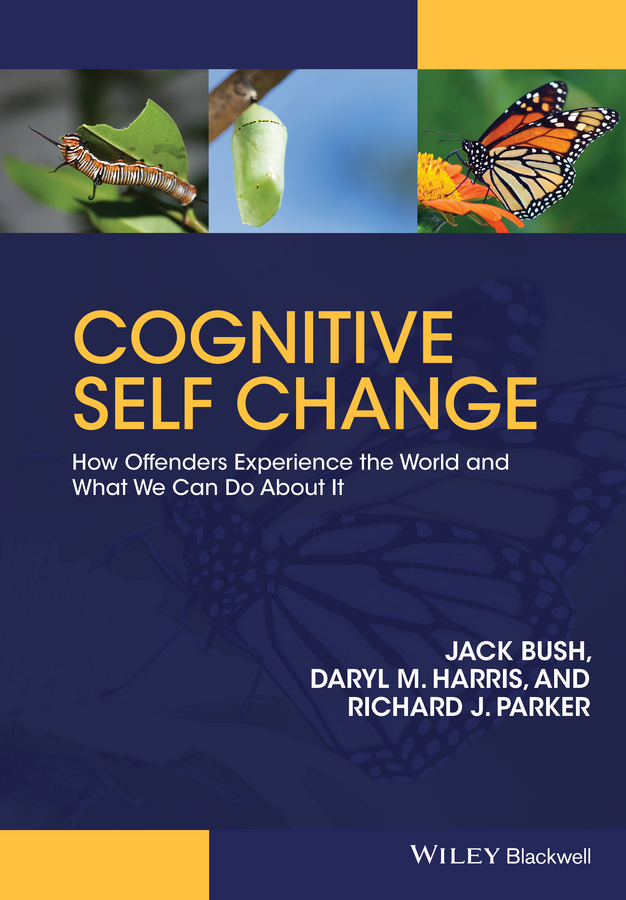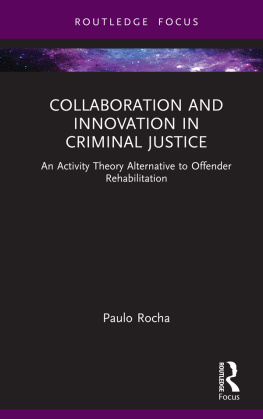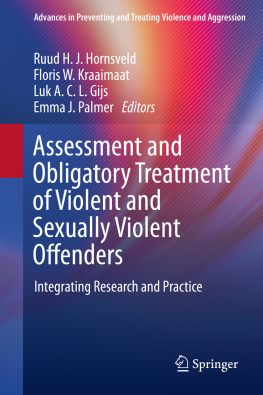
Table of Contents
List of Illustrations
- Introduction
- Chapter 03
- Chapter 04
- Chapter 05
- Chapter 06
Guide
Pages
Cognitive Self Change
How Offenders Experience the World and What We Can Do About It
Jack Bush, Daryl M. Harris, and Richard J. Parker
This edition first published 2016
2016 John Wiley & Sons, Ltd.
Registered Office
John Wiley & Sons, Ltd, The Atrium, Southern Gate, Chichester, West Sussex, PO19 8SQ, UK
Editorial Offices
350 Main Street, Malden, MA 02148-5020, USA
9600 Garsington Road, Oxford, OX4 2DQ, UK
The Atrium, Southern Gate, Chichester, West Sussex, PO19 8SQ, UK
For details of our global editorial offices, for customer services, and for information about how to apply for permission to reuse the copyright material in this book please see our website at www.wiley.com/wiley-blackwell.
The right of Jack Bush, Daryl M. Harris and Richard J. Parker to be identified as the authors of this work has been asserted in accordance with the UK Copyright, Designs and Patents Act 1988.
All rights reserved. No part of this publication may be reproduced, stored in a retrieval system, or transmitted, in any form or by any means, electronic, mechanical, photocopying, recording or otherwise, except as permitted by the UK Copyright, Designs and Patents Act 1988, without the prior permission of the publisher.
Wiley also publishes its books in a variety of electronic formats. Some content that appears in print may not be available in electronic books.
Designations used by companies to distinguish their products are often claimed as trademarks. All brand names and product names used in this book are trade names, service marks, trademarks or registered trademarks of their respective owners. The publisher is not associated with any product or vendor mentioned in this book.
Limit of Liability/Disclaimer of Warranty: While the publisher and authors have used their best efforts in preparing this book, they make no representations or warranties with respect to the accuracy or completeness of the contents of this book and specifically disclaim any implied warranties of merchantability or fitness for a particular purpose. It is sold on the understanding that the publisher is not engaged in rendering professional services and neither the publisher nor the author shall be liable for damages arising herefrom. If professional advice or other expert assistance is required, the services of a competent professional should be sought.
Library of Congress Cataloging-in-Publication data applied for
Hardback ISBN: 9780470974827
Paperback ISBN: 9780470974810
A catalogue record for this book is available from the British Library.
Cover image: GettyImages skhoward
Shutterstock James Laurie
iStockphoto Narelle Robson-Petch
To our children
Deborah and Kalita;
Julia, Angie, Joanna, and Johnny;
Owain and Aneurin
And in memory of Don Andrews
Preface
The authors came together to write this book from diverse and distant places. Jack Bush (PhD in philosophy) from Tacoma, Washington, USA, entered the field of correctional treatment in 1973 before widespread acceptance of evidence-based practice, and before the term what works was part of professional parlance. Bushs education in correctional treatment consisted largely of listening to offenders and ex-offenders tell their stories of how they perceived the world. Daryl Harris (doctorates in both clinical psychology and neuropsychology) has pursued a practical career in forensic psychology in Great Britain from his home in Wales. Richard Parker (PhD in criminology) has developed and delivered treatment programs for offenders in Canberra and Sydney, Australia. In a sense and to varying degrees, we all grew up professionally in the blossoming era of evidence-based practice. And each of us experienced frustration in our encounters with the culture of actual forensic practice.
With a background of counseling voluntary and semi-voluntary clients, Parker felt some contradictions in the what works literature. How do you individualize treatment while maintaining program integrity? How do you keep relatively unmotivated high-risk offenders involved in community treatment programs geared more to motivated medium-risk offenders? Parker saw even the most motivated offenders trying hard, but ending up confused and overwhelmed by the large number of skills they were asked to learn.
Harris recalls a warning from the head of security at his first clinical psychology post at a high security hospital in the UK. Do not turn your back on them for a second, the security official counseled, or they will assault you and that will be the end of your war. The comparison of offender treatment with combat, with treatment providers expected to be on their guard and offenders feeling under siege, is abhorrent to the authors and, we believe, clinically futile.
We were frustrated with the adversarial stance of us versus them and the conception of corrections, including correctional treatment, as a kind of war. We found the delivery of treatment within that culture to be a battle within the criminal justice system a battle of the system fighting against itself. We were equally uncomfortable with the clinical notion of criminality as a kind of disease. And we were frustrated (as we believe all practitioners of correctional treatment sometimes are) with the barrier to communication posed by offenders themselves by their attitudes of hostility and non-compliance to authority. And yet, if it is indeed a war between prison authority and offenders, who can blame offenders for vowing not to lose?
Our common backgrounds, diverse as they are, united us behind the major themes of this book. Our understanding of offenders as human beings derives less from statistical outcome studies and more from our personal communication with individual offenders and ex-offenders. Yet we acknowledge and respect the quantitative evidence of what works in this field.
We have each been strongly influenced by the what works literature originated by Canadian researchers, and particularly by Don Andrews. Bush first met Don Andrews on a cocktail cruise on board a boat on Lake Huron in 1988. The cruise was sponsored by a Canadian correctional treatment conference. Andrews was spreading the word about the analyses of correctional treatment outcomes being performed by him and other Canadian researchers. Bush was implementing the Cognitive Self Change program for violent offenders in the American state of Vermont. Cocktails in hand, Bush explained to Andrews why, based on his experience with offenders, it was important to pay attention to the most criminal of offenders (not the easy cases), to pay particular attention to how they think, and to communicate with them in ways that do not lead them to reject our message and us. Andrews explained to Bush the statistical foundations of risk, need, and responsivity. It was a moment of mutual recognition. We were describing the same phenomena from two different points of view, and coming to the same conclusions.
That moment of recognition captures the intent and structure of this book. The authors do not offer an alternative to quantitative science as a way to understand criminal behavior and what to do about it. Rather, we present an additional dimension to that understanding. This is the dimension of human experience, of offenders experience and our own. We believe this aspect of our shared humanity provides a potential key to diminishing the war between us and them, and in some cases to resolving it.
Next page




